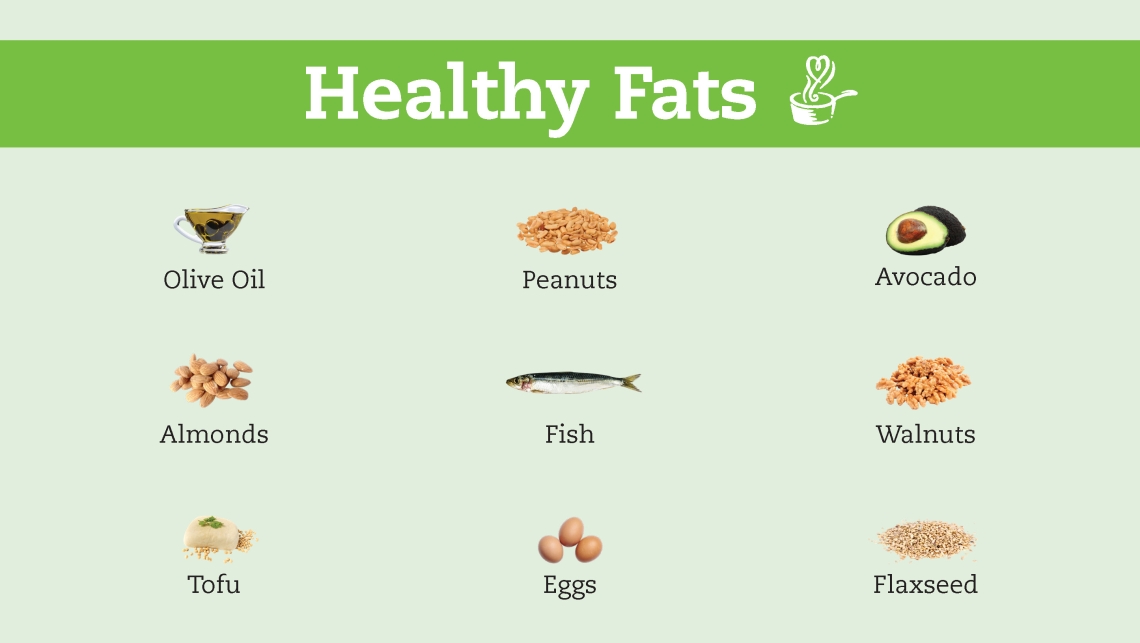
Each month, our Project Open Hand nutrition team creates a new menu for clients, which includes a section dubbed the “menuback” that includes information on different nutrition and health topics such as calcium, prediabetes, and stocking a healthy pantry on a budget. For this January’s menuback, learn about the role that fats play in our diets and their unique impacts on our health from Project Open Hand’s Registered Dietitian, Fernanda Nunes.
Food is made up of three macronutrients: carbohydrates, proteins, and fats. Fats, which play critical roles in optimizing health, are recommended to make up 25–35% of your daily calories. In a 2,000 calorie diet, this means between 500–700 calories daily. There are 9 calories in 1 gram of fat, so this translates to 55–77 grams of total fat per day.
Fats are needed for the absorption and transport of fat-soluble vitamins (like vitamins A, D, E and K), to build hormones, regulate body temperature, provide physical cushioning and protection for our organs, store energy, and promote skin health. However, not all fats are created equal.
Saturated Fats Should Be Limited
Foods high in saturated fats include butter, fatty meat (beef, pork, bacon, sausage), poultry skin, lard, full fat dairy (milk, yogurt, cheese), coconuts, palm oil.
Saturated fats should be limited because, when consumed in excess, they can elevate "bad" cholesterol known as low-density lipoprotein (LDL), which can increase one’s risk of heart disease and stroke
It is recommended that a person’s daily intake of saturated fat remains below 10% of their daily caloric intake. For a daily diet of 2,000 calorie, this translates to less than 22g of saturated fat per day.
Unsaturated Fats Help Decrease “Bad” Cholesterol
Regular consumption of unsaturated fats can decrease “bad” cholesterol (LDL) and increase “good” cholesterol (high-density lipoprotein or HDL), decreasing the risk of heart attack and stroke. It is therefore recommended that unsaturated fats make up 90–100% of a person’s total fat consumption.
Where to Find Unsaturated Fats
Unsaturated fats can be broken down into two different types: monounsaturated and polyunsaturated fats:
-
Monounsaturated Fats (MUFAs): Foods that are high in monounsaturated fats include oils such as olive, canola, peanut, safflower, and sesame, and foods such as avocados, peanuts, almonds, hazelnuts, pecans, pumpkin seeds, and sesame seeds.
-
Polyunsaturated Fats (PUFAs): Polyunsaturated fats can be found in sunflower, corn, soybean, canola and flaxseed oils, walnuts, flax seeds, sunflower seeds, fatty fish, tofu, and soybeans.
PUFAs: Essential Fatty Acids
Two major classes of PUFAs are omega-3 and omega-6 fatty acids. Omega-3 and omega-6 are considered “essential fatty acids” because they can’t be produced by the body, and can only be acquired through consuming food. They are both: beneficial for heart health, cell structure, and cell growth. They are also involved with the body’s inflammatory response. Additionally, omega-3 is important for optimal brain function.
The ratio of omega-6 to omega-3 in a person’s diet is important; when omega-6 is consumed is more than the omega-3 consumed, it can promote an inflammatory environment in the body. In general, it is recommended that the ratio between omega-6 to omega-3 remains between 1:1 and 4:1.
Omega-3 is found in flaxseed, walnuts, chia seeds, soybean oil, algae, and fatty fish. Omega-6 is found in safflower oil, sunflower oil, sesame oil, corn oils, canola oil, walnuts, sunflower seeds, tofu, eggs, and mayonnaise.
Avoid Trans Fats
Lastly, trans fats are the type of fat to avoid. Trans fats do not occur naturally, but are instead made industrially. Their intake is associated with decreased HDL and increased LDL, increasing the risk of heart disease and stroke.
Trans fats can be found in cakes, cookies and pies, shortening, microwaved popcorn, frozen pizza, refrigerated dough (such as biscuits and rolls), fried foods (including french fries, doughnuts, and fried chicken), stick margarine, and nondairy coffee creamer that list partially hydrogenated oils in the ingredients.
Despite being so widely available in processed foods, the good news is that California banned trans fats from distribution and use because of their harmful health impacts, so they are much less common in our food supply now.
